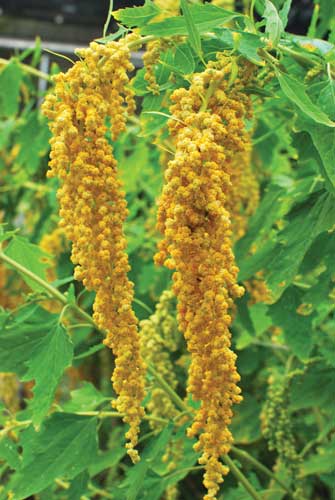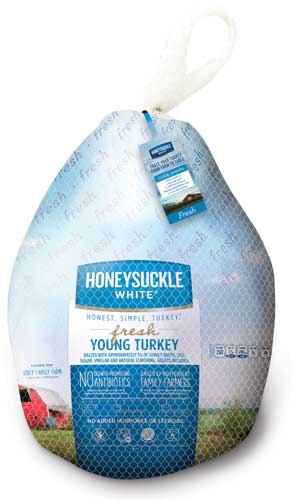Quinoa may hold key to salt-tolerant crops; Transparency for the Thanksgiving turkey
CUTTING EDGE TECHNOLOGY
 Quinoa may hold key to salt-tolerant crops
Quinoa may hold key to salt-tolerant crops
Due to special bladders on its leaves that can store salt from saline soils, the quinoa plant might serve as a model for breeding other salt-tolerant crops. The ability for crops to tolerate salinity may become a necessity in certain regions of the globe where global warming may lead to more frequent and more severe droughts, which will force farmers to irrigate their fields.
“All approaches so far to breed salt-tolerant plants must be considered more or less as failures,” declared professor Rainer Hedrich, plant scientist at the Julius-Maximilians-Universität (JMU) Würzburg in Bavaria, Germany. “Our crop plants are the result of many years of breeding. During that time, man has sheltered them from nearly all negative environmental influences, so that they have lost a lot of their natural resilience. As soon as these elite lines come in contact with too much salt, they usually die.”
To counter this problem, Hedrich, together with professor Sergey Shabala at the Univ. of Tasmania, set out to develop a new strategy. The two scientists placed their bet on plants that are naturally salt-tolerant.
One such plant is quinoa, which comes from the Andes where it has been used as food for 7,000 years. The plant absorbs salt from the soil and stores it in bladder-shaped cells on the surface of its leaves. This protects the salt-sensitive metabolic processes, and the plant can grow even in saline soils.
To understand how the bladder cells work, Hedrich and Shabala enlisted the expertise of scientists from China and Germany to unlock the cereal’s genome. Their findings are published in a paper “A high-quality genome assembly of quinoa provides insights into the molecular basis of salt bladder-based salinity tolerance and exceptional nutritional value” in Cell Reports.
What they found is that there are genes working in the bladder cells that only activate when the plant is under stress. They include transporters carrying sodium and chloride ions into the bladder cell. The ultimate outcome of their research may include the breeding of quinoa varieties with higher salt tolerances as well as crossbreeding the salt tolerance genes into related crops such as sugar beets or spinach.
controls Transparency for the Thanksgiving turkey
Transparency for the Thanksgiving turkey
More and more consumers are demanding to know where their food comes from, how it was grown and made, and the types of ingredients. Through its Honeysuckle White brand of turkeys, Cargill is piloting blockchain technology in select markets in Texas to offer consumers the ability to trace their Thanksgiving turkeys from a family farm to their table.
Consumers can text or enter an on-package code at HoneysuckleWhite.com to access the farm’s location by state and county, view the family farm story, see photos from the farm, and read a message from the farmer. “The Honeysuckle White brand is committed to food transparency and we’re the only major turkey brand to exclusively provide family farm-raised turkey,” said Deborah Socha, Honeysuckle White brand manager. “We know consumers are looking beyond farm-to-table marketing promises to better understand where their food comes from and how it is produced. That’s why the Honeysuckle White brand is the first and only major turkey brand to pilot a blockchain-based solution for traceable turkey.”
The pilot for traceable turkeys uses a first-to-market blockchain-based solution developed by Cargill. Blockchain models build a trusted, transparent food chain that integrate key stakeholders into the supply chain and create a distributed ledger with immutable records. Because all participants inside the blockchain network must agree before a new record is added to a ledger, the technology also reduces the risk of fraud or human error, and cryptography within the network ensures security, authentication, and integrity of transactions.
“At Cargill, we are becoming a better partner through digitalization and analytics, identifying opportunities to use technology to deliver real value for customers, partners, and consumers,” said Deb Bauler, Cargill chief information officer for North American Protein. “The transparency pilot is one example of how we are using technology to shape the food system of the future and deliver on consumers’ desire for transparency in food.”
If you are working on or know of some cutting edge technology that you would like to be featured in this column, please send an email to [email protected].
